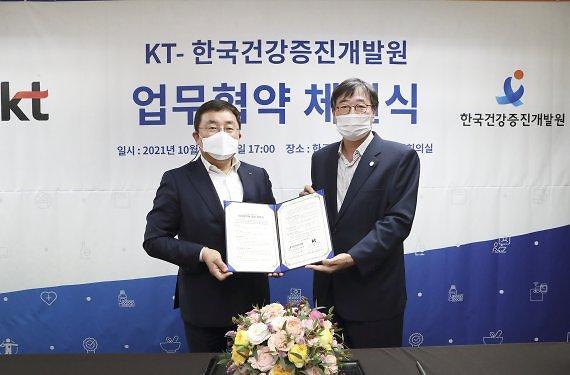
[Courtesy of KT]
South Korea has witnessed a fast-growing population of elderly people aged 65 or more. Data released by Statistics Korea showed that the rate of the country's elderly population is projected to increase from 15.7 percent in 2020 to 20.3 percent in 2025. Domestic companies are accelerating digital transformation, a global trend in many industrial sectors that normally rely on the human workforce, to upgrade their work efficiency by simplifying work using autonomous software and robots that can complete simple and repetitive tasks.
KT said in a statement on October 8 that the company forged a strategic partnership with the Korea Health Promotion Institute to apply AI and robot technologies to a public health management program for old people. Through KT's technical support, the institute will upgrade and popularize a conventional AI and internet of things (IoT)-based elderly health management project. A smartphone healthcare service app will be adopted by public health centers nationwide.
"Through this opportunity, we will share KT's digital technologies to upgrade South Korea's public health improvement programs and provide support to the underprivileged," KT official Song Jae-ho was quoted as saying.
KT has focused on offering advanced digital healthcare services by establishing information communication technology (ICT)-based health business models. In September 2020, KT partnered with NGeneBio, a molecular diagnostics venture that provides clinical analysis software, to establish specialized platforms for storing and managing personal genetic analysis information. In October 2021, KT also tied up with Zena, a domestic startup with biometric data analysis technology, to introduce an AI-based healthcare kiosk that can measure blood pressure and heartbeat. KT said KT's healthcare-specific video call solution will be combined with Zena's health data analysis solution.
Copyright ⓒ Aju Press All rights reserved.




